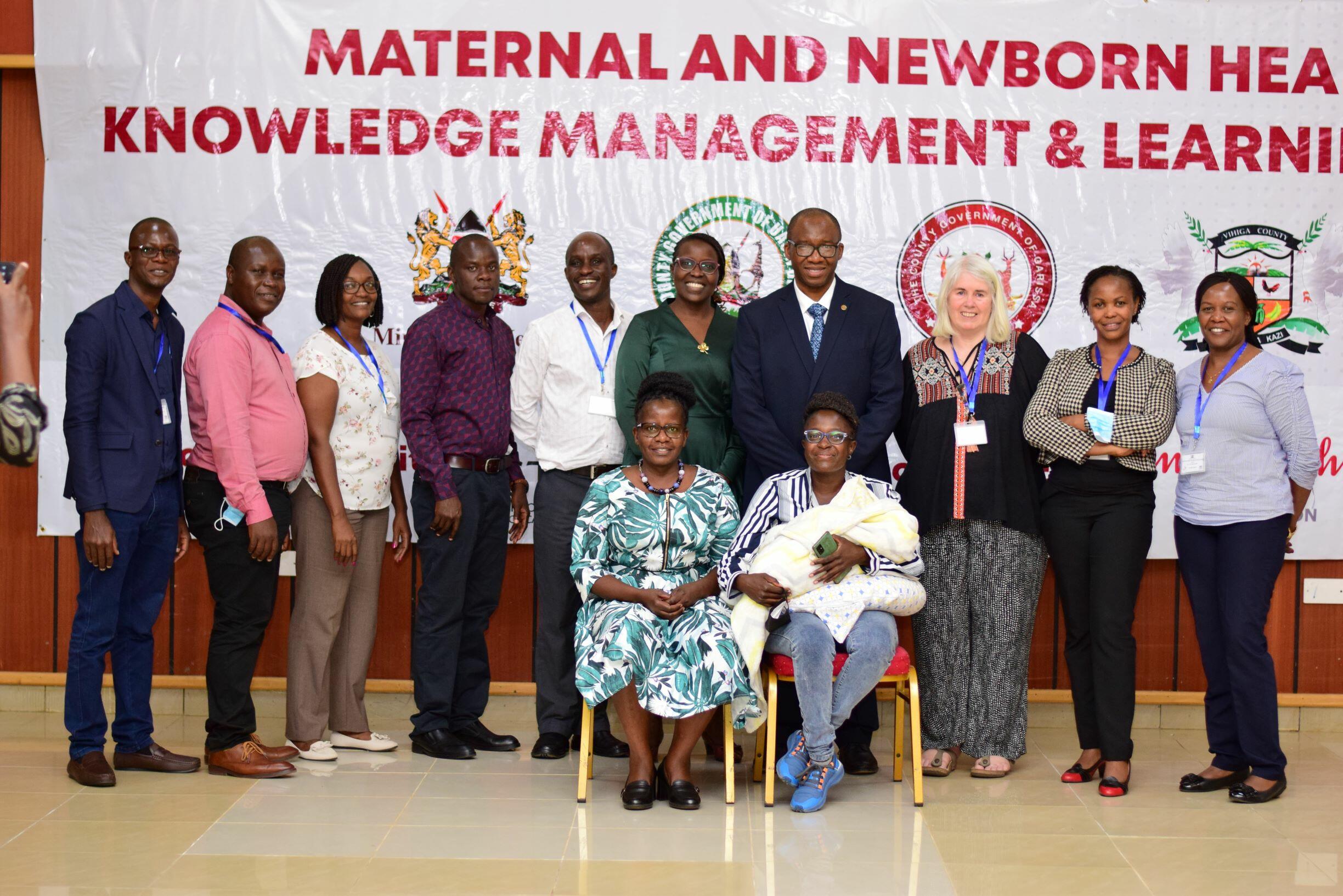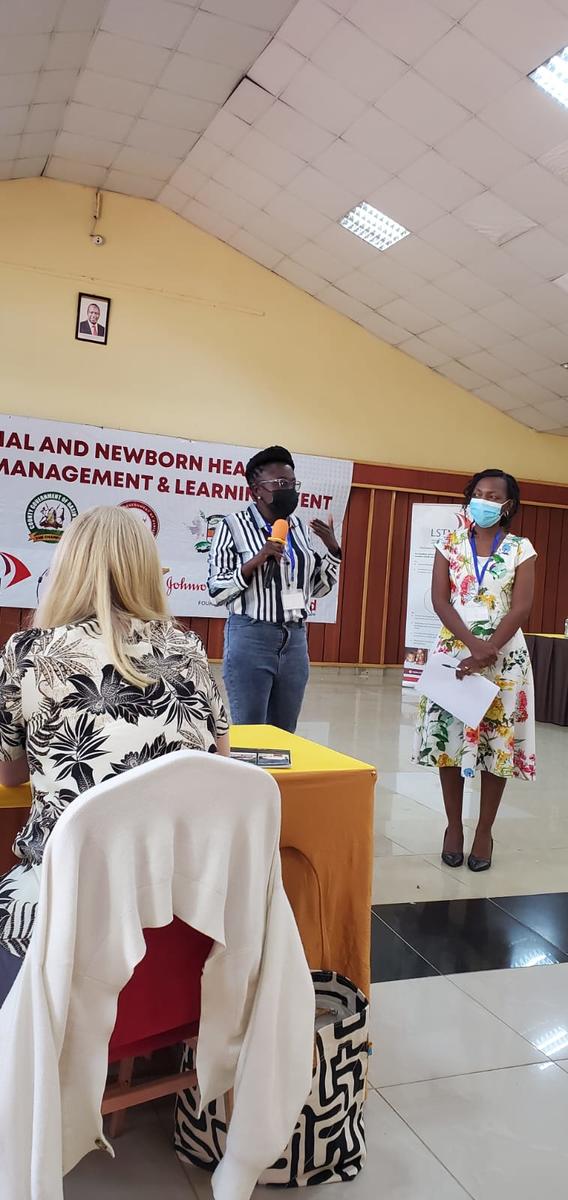
Having a face to statistics on maternal and perinatal outcomes changes how Health Service Providers look at and interpret them. In Kenya, thirty-nine infants out of every one thousand live births do not live beyond one-month. In a context and culture where perinatal deaths are not taken ‘seriously,’ and their bereaved mothers are encouraged with “you will get another one,” LSTM, with support from the Foreign, Commonwealth & Development Office of the United Kingdom (UKaid), is working with the Kenya Ministry of Health (MoH) to strengthen the capacity of skilled health personnel (SHP) to provide Emergency Obstetric and Neonatal Care (EmONC).
During a Knowledge Management and Learning event organised by LSTM and hosted by Uasin Gishu County in March 2022, the Reproductive Health (RH) Coordinator of Transzoia county, shared her personal story of hope, reflecting on the benefits of the LSTM interventions. The event was attended by frontline obstetric and newborn care providers from ten counties, donors, preservice regulatory and training institutions, and policy makers at national (Ministry of Health in Kenya) and subnational level (county).
|
"I can tell mothers, children and midwives that maternal and perinatal deaths can be prevented with quality care; I survived, and I am here to tell the story" RH Coordinator |

Born preterm, she weighed seven hundred grams at birth and her mother had suffered obstetric complications (Preeclampsia) that resulted in a preterm Emergency Caesarean section. She was presumed lifeless but her obstetrician, Dr. Margaret (not her real name) ensured she was resuscitated. “I was so small and scary that my father collapsed on seeing his newly born daughter;” The mother too wept fearing she could never make it. Sarah (not her real name) received critical care from devoted skilled health personnel at the Kenyatta National referral hospital in Nairobi, Kenya, where she was admitted for the first five months of her life. During her stay at the neonatal unit, she was not spared from newborn complications including neonatal jaundice and other infections. With support and encouragement from dedicated SHPs at the hospital and her family, Sarah was successfully discharged from hospital, five months old, weighing 1.5kg. This would be a bordering low birth weight baby in normal circumstances.
As a mother, Sarah has also faced her fair share of obstetric emergencies that resulted in an emergency caesarean section for her fourth-born child. Thanks to the competence of the doctors and midwives who attended to her, her child survived and was discharged alive. Today, Sarah is a trained midwife, a proud mother of four and RH Coordinator in her county. She shares this story of hope and the opportunities provided through LSTM to upskill maternity care providers to ensure that more women have a positive experience at birth and good outcomes, like she has. Her passion about supporting mothers and babies to survive, defines her role in her position as Country Reproductive Health Coordinator.
Sarah concluded that ‘timely and quality maternal and new care, mothers and babies who face obstetric complications can live and thrive to become useful citizens for this county’.
It is for these mothers and babies at risk that LSTM, with support from UKaid has partnered with National MoH and county health departments to strengthen the capacity of in-service SHP in emergency obstetric and neonatal care.
Since April 2019, the program has trained over 1600 across the country in EmONC and Advanced Obstetric, surgical, and Anaesthetic Care skills (AOAC). LSTM also supports counties with post-training follow-up and mentoring at the health facilities, field visits, virtual technical support, Continuing Professional Development (CPD) webinars, and development of county strategies for SHP staff retention within Maternal and Newborn (MNH) units. LSTM has also supported National MoH to develop National guidelines on EmONC mentorship.
Beneficiaries from these trainings have endorsed the quality trainings and post-training follow-up support they have received from LSTM, which have translated into better quality of care.
|
“Post-AOAC training, my MOs have greatly increased confidence in performing difficult C/S. I have mentored nurses to conduct AVDs with favourable results” Medical Superintendent, BF SCH UasinGishu |
In his remarks, Dr. Nassir Abdallah Shaban an AOAC trainer (Mombasa county), said AOAC has not only transformed his obstetric practice, but also through LSTM, provided him with the rare opportunity of investing in careers of other doctors.
| “I would also like to take this opportunity to thank my mentors who made me who I am today, … and the whole team from LSTM. Thank you for believing in me’ Dr. Nassir (AOAC trainer) |
LSTM acknowledges the partnership with National Ministry of Health, County health departments of Uasin Gishu, Vihiga, Garissa, Kilifi and Taita Taveta; as well as support from UKaid. LSTM remains committed to promoting and supporting sustainable strategies to reduce maternal and perinatal mortality and morbidity in Kenya.